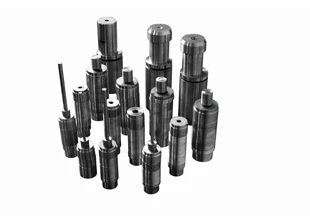In the ever-evolving world of electronics manufacturing, precision fastening plays a crucial role in ensuring the reliability and durability of electronic devices. One of the key players in achieving precision fastening is the Bolt Manufacturing Machine. This blog explores the importance of Bolt Manufacturing Machines and their impact on precision fastening in the electronics industry.
What is a Bolt Manufacturing Machine?
A Bolt Manufacturing Machine is a specialized piece of equipment designed to automate the process of producing bolts, nuts, and other fastening components. The bolt former machine utilizes advanced technologies, such as computer numerical control (CNC) systems, to produce bolts with high precision and accuracy. By automating the manufacturing process, Bolt Manufacturing Machines significantly eliminate human errors and improve productivity.
The Role of Precision Fastening in Electronics
Precision fastening is crucial in the electronics industry to ensure the integrity of electronic devices. Electronic components, such as printed circuit boards (PCBs), require secure and reliable fastening to withstand various external factors, including vibrations, shocks, and changes in temperature. Precision fastening ensures that the components are tightly held together, reducing the risk of failure and enhancing the overall performance and longevity of electronic devices.
How Bolt Manufacturing Machines Improve Precision Fastening
Bolt Manufacturing Machines have revolutionized precision fastening in the electronics industry. Here are some ways these machines enhance the process:
Consistent Quality
Bolt Manufacturing Machines are programmed to produce bolts that meet the exact specifications required in electronic devices. They can consistently produce bolts with precise dimensions, torque, and threading. This consistency ensures that each bolt performs as expected, reducing the risk of failure due to poor fastening.
Increased Efficiency
Bolt Manufacturing Machines automate the entire bolt production process, eliminating the need for manual labor. This automation significantly speeds up the manufacturing process, reducing production time and increasing overall efficiency. Additionally, this fully automatic nut bolt making machine can produce a large number of bolts in a relatively short period, ensuring a steady supply for electronics manufacturers.
Enhanced Customization
Bolt Manufacturing Machines can be easily programmed to produce bolts of various sizes and specifications. This versatility allows electronics manufacturers to meet the specific fastening requirements of different electronic devices. Whether it's a small handheld device or a large industrial equipment, Bolt Manufacturing Machines can tailor the bolts accordingly, ensuring a perfect fit.
Future Advancements and Trends in Bolt Manufacturing Machines
As technology continues to advance, so does the capabilities of Bolt Manufacturing Machines. Some future advancements and trends in this field include:
Integration of IoT
Internet of Things (IoT) technology is increasingly being integrated into Bolt Manufacturing Machines, allowing manufacturers to monitor and control operations remotely. This connectivity enables real-time data gathering, predictive maintenance, and overall optimization of machine performance.
Improved Sustainability
Bolt Former Machines are being designed to minimize material waste and energy consumption. This advanced fastener equipment utilizes advanced cutting techniques and recycling mechanisms to reduce its environmental footprint while maintaining high-quality bolt production.
In conclusion, Bolt Manufacturing Machines play a critical role in achieving precision fastening in the electronics industry. Their consistent quality, increased efficiency, and customization capabilities have significantly impacted the manufacturing process. As technology continues to advance, these machines are expected to witness further advancements, contributing to the continuous improvement of precision fastening and the overall reliability of electronic devices.
 English
English français
français Español
Español русский
русский português
português



